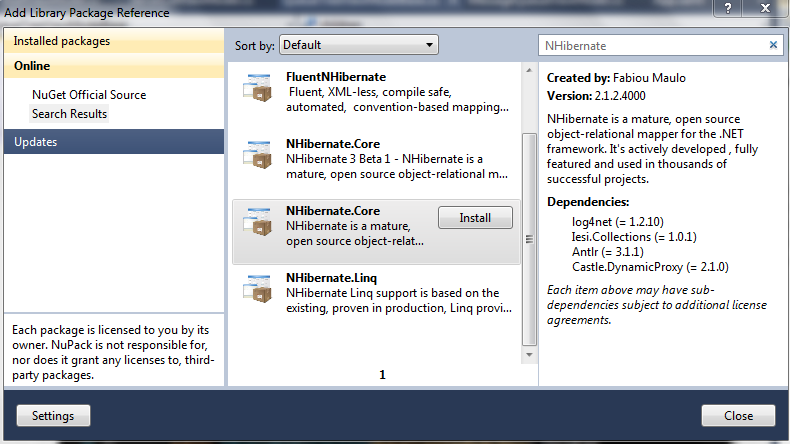The new kid on the block in the .NET world is a package management tool from Microsoft named NuGet (previously NuPack). I’m excited to see Microsoft getting into this game since I’ve noticed a lot of my projects have been heavily dependent on third party libraries. My normal process for handling these dependencies is to create a library directory and put all the DLLs that I need in there. This worked fine for simple projects, but became complex when I had multiple projects with interdependencies. In those cases, I had to make sure that each of the third party DLLs were the same version for both of the projects, or I created a external subproject in mercurial that hosted the main DLLs.
In comes NuGet/NuPack. This really got me excited since I had been accustomed to packaging systems such as ruby gems and Debian’s aptitude). I can now pick and choose which third party assemblies I want, and have it install everything automatically. It also handles the dependencies and upgrades as needed. I can just choose NHibernate.Core, and its insurmountable dependencies are pulled in for me.

Once I clicked the install button, NHibernate and all its dependencies were cleanly added to my project, and a nice little packages.config file was added with the following content:
1 2 3 4 5 6 7 8 9 | |
Of course, the configuration files weren’t updated for NHibernate configuration (which can be complex to setup), but this is most likely a packaging issue and not a problem with the plugin. I’m hoping the team who put together the package will add some example configuration.
Also, a nice addition is the Package Manager Console. This is a PowerShell shell that you can use to install the packages, in case you already know which to add. This seems faster to me, a reformed console guy, but your mileage may vary.
NuGet downloads all the packages into your solution folder under “packages.” These DLLs are then added as local references in the project. You can add the packages folder to version control to safely keep them with the project. I was disappointed to see that the packages.config isn’t automatically checked at load. It would be nice to have these dependencies downloaded automatically so we don’t have to add the DLLs to version control.
So this gets me to my point about some features I see as currently lacking. Now, please take my criticism with a pound of salt; NuGet is still early alpha. I know this is not a bug free/feature complete release, especially since I’m living on the edge.
Bundler is a gem manager for ruby, and has recently been included with the now released ruby on rails 3.0. Using a simple Gemfile, bundler will install all the dependent gems in their correct locations. It handles versioning and what the .NET crowd would call strong names. So it’s pretty obvious that these two systems are trying to handle the same problem… dependencies.
Overall, I’ve found NuGet a great start in this field for the .NET world. Most of everything worked out of the box. I had the occasional hiccups with installs. For example, NLog would not install after playing around with the package manager for a while. My guess is that the caching of the dependencies into the “packages” folder broke something. I didn’t look too deeply into it yet.
In my next post I’ll try going feature by feature through both NuGet and Bundler to compare what each does right and possibly what can be fixed. I’m a little upset I didn’t get to it this time around, but I was actually struggling with syntax highlighting plugins for WordPress for an hour or so.